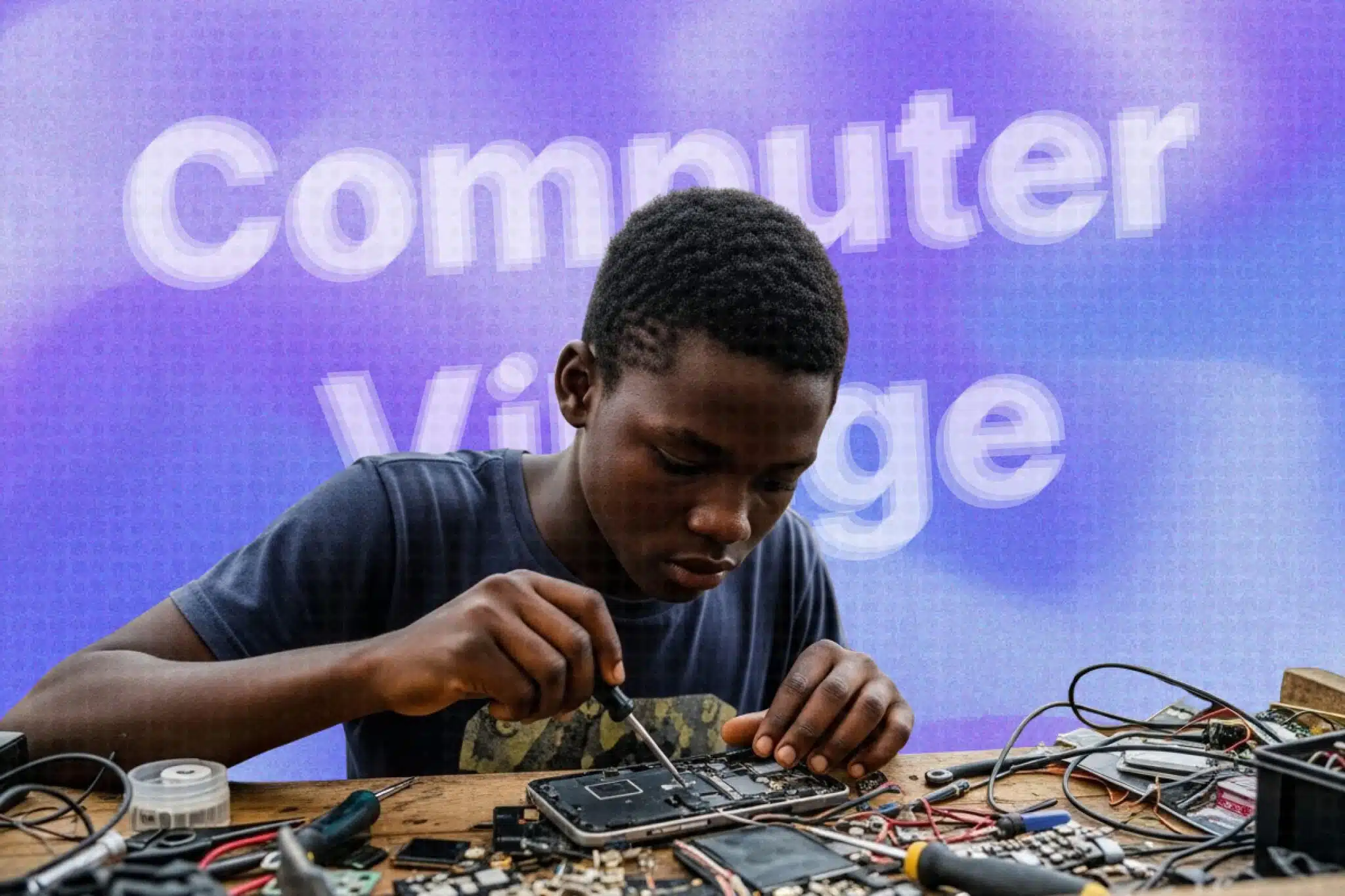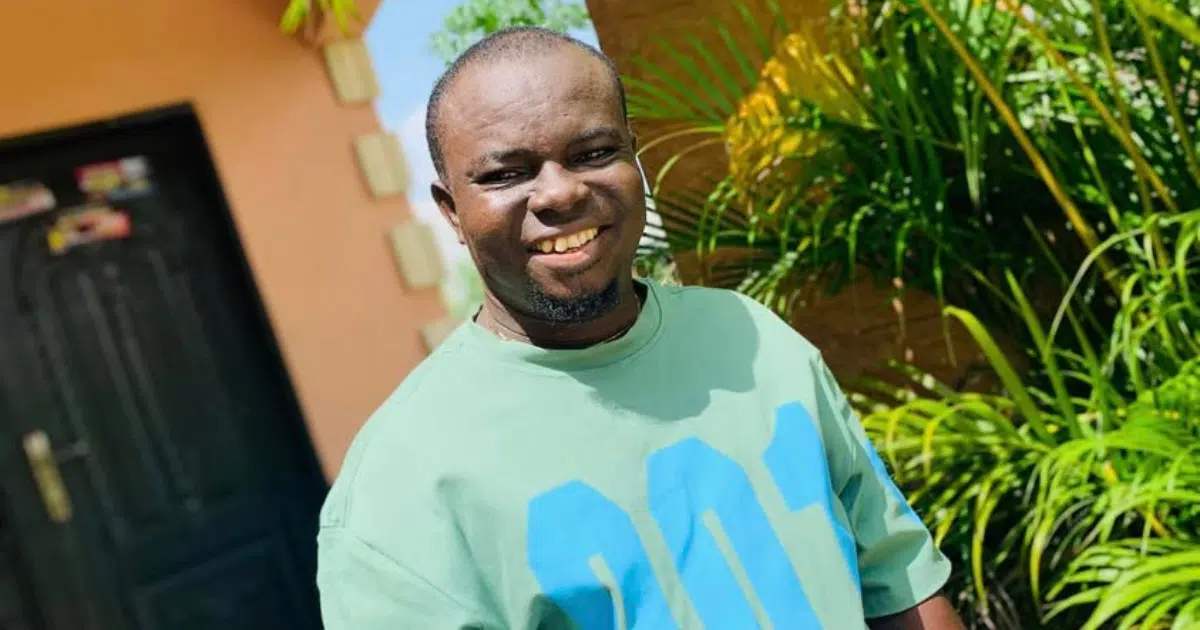In the busy streets of Ikeja’s Computer Village, one of the largest technology markets in Africa, teenagers and school leavers are quietly building a new future for themselves.
With university education increasingly out of reach for many Nigerian families due to rising tuition fees and limited funding, young Nigerians are turning to technical skills as an alternative. For these aspiring technicians, learning to repair phones and computers is not just a stopgap but a lifeline.
“I’ve always had the talent as a kid for loosening and fixing things,” 17-year-old Emmanuel Beyioku, who recently completed his secondary school education and is waiting to sit for the Joint Admissions and Matriculation Board (JAMB) examination, shared with Techpoint Africa.
“I love technology. I love creating and fixing things. So instead of just sitting at home doing nothing, I decided to come here and learn phone and computer repair.”
In a workshop tucked away on Adepele Street in Ikeja, Beyioku is one of several teenagers receiving hands-on training in basic electronics, smartphone diagnostics, and laptop repair. Many trainees come with their own toolkits, ranging from seven tools to precision star drivers, while others purchase theirs over time.
“There’s no discrimination about learning this work,” he said. “Some of us are here for three months, others for a year. It depends on how far you learn. I’ve committed to six months because I know why I’m here, and I’m focused.”
Rising opportunity
Nigeria currently faces one of the highest youth unemployment rates in Africa. As of Q1 2024, the unemployment rate among Nigerians aged 15-24 stood at 8.4%, according to the National Bureau of Statistics (NBS). Unofficial estimates suggest this figure may be significantly higher, with millions of young Nigerians out of formal education or employment.
The country also grapples with 18.95 million out-of-school children, the highest on the African continent, largely due to insecurity, economic pressures, and gaps in infrastructure. Meanwhile, inflation surged to 34% in mid-2024, drastically reducing household income and limiting access to tertiary education.
In contrast, Africa’s digital economy presents a hopeful future. According to the International Finance Corporation (IFC) and Google, Africa’s internet economy has the potential to contribute $180 billion (5.2% of the continent’s GDP) by 2025 and up to $712 billion by 2050, driven by mobile phone penetration, digital entrepreneurship, and youth-led innovation.

Victoria Fakiya – Senior Writer
Techpoint Digest
Stop struggling to find your tech career path
Discover in-demand tech skills and build a standout portfolio in this FREE 5-day email course
While countries like Kenya, South Africa, and Nigeria have made headlines for producing software engineers, fintech startups, and digital hubs, informal tech spaces, like Computer Village, are quietly laying the foundation for grassroots innovation by granting access to teenagers — both male and female — to learn technical skills.
The self-driven approach to acquiring hardware repair skills, often overlooked, is proving to be just as vital in preparing the continent’s largest youth population for a tech-enabled future.
“We just have to empower young people here in order to reduce juvenile delinquency,” one of the tutors said.
A cost-effective pathway into tech

Compared to tech bootcamps or coding schools, where tuition can range between ₦250,000 and ₦500,000, a technical repair training offers a more affordable entry point into the technology ecosystem. Many of the trainees here pay between ₦50,000 and ₦100,000 to complete their programs. More importantly, the skills they gain are immediately marketable.
“People don’t really know much about what we do or how important it is,” said Sanni Damilare, another trainee. “But once you learn it properly, you can start earning daily. My goal is to open a place of mine just like my boss,” he told Techpoint Africa.
Though Damilare initially signed up for a six-month training period, he says he is willing to stay longer to gain mastery.
“It’s not about rushing. You need to plan well before starting out on your own. Diligence is more important than speed.”
While the majority of learners are male, some young girls are also taking part. Among them is Beyioku’s sister, who has now advanced to handling laptops, printers, and hardware. Instructors encourage more female participation, noting the industry’s growing demand for reliable technicians regardless of gender.
Changing mindsets around informal tech work
Henry Afolabi, who runs the workshop and serves as the lead instructor, has been in the business for over a decade. He says technical repair is often misunderstood and underappreciated, but it has changed his life.
“This is the same skill I learnt 12 years ago,” he said. “By God’s grace, I’ve bought land and built a house with the income I make here. I’m happily married with two kids.”
Afolabi urges his students to stay focused and avoid get-rich-quick distractions. “If you are good at what you do, you keep getting referrals. That’s how you grow in this business. This job gives you daily income, a privilege many 9-to-5 workers don’t enjoy.”
He also addresses common misconceptions and reputational concerns.
“People think all phone repairers are dodgy, but I’ve never had a customer accuse me of stealing or damaging their device,” he said. “We keep learning about software, hardware, and networking. There’s a lot of tech involved beyond just changing screens.”
Redefining the future of work
In a nation where economic stability feels increasingly elusive, practical skills redefine what employability means for young Nigerians. For Beyioku and his peers, the ability to earn a living through mobile and computer repairs provides both autonomy and purpose.
“I already see where this can take me,” he said. “Even if I go to university later, I won’t be depending solely on anyone. I’ll have my skills to support me.”
What may appear from the outside as small repair gigs is, in reality, a quiet revolution, one powered by resourcefulness and an eagerness to participate in Africa’s digital future.










